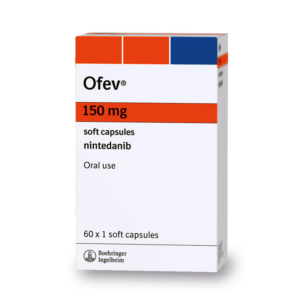The Malaysian Health Authority-National Pharmaceutical Regulatory Agency (NPRA), Ministry of Health Malaysia released a new drug safety alert for nintedanib.

Nintedanib is a small molecule tyrosine kinase inhibitor (TKI) indicated for the treatment of idiopathic pulmonary fibrosis in adults and to slow the rate of decline in pulmonary function in patients with systemic sclerosis-associated interstitial lung disease (SSc-ILD). Nintedanib targets three key receptors including the vascular endothelial growth factor receptors (VEGFR 1-3), fibroblast growth factor receptors (FGFR 1-3) and platelet derived growth factor receptors (PDGFR).

Nintedanib Tablets
Ischaemic colitis is caused by insufficient blood flow to the large intestine due to narrowed or blocked blood vessels (arteries) which results in mucosal ulceration, inflammation, and haemorrhage. This diminished blood flow does not provide enough oxygen for the cells in the digestive system.
Causes: Physiological (hypotension, secondary to embolus or thrombosis) or iatrogenic secondary to medicines or surgery. The clinical manifestations of ischaemic colitis are diarrhoea, colicky abdominal pain, and rectal bleeding.
In February 2020, Malaysian Health Authority, NPRA received a safety issue notification from Boehringer Ingelheim Sdn. Bhd. regarding a signal assessment of ischaemic colitis associated with nintedanib use. This assessment was published in the World Health Organisation (WHO) Pharmaceuticals Newsletter in December 2019.
Safety Evidence (Case reports) at WHO’s global database-VigiBase:
In Dec 2018, during the screening of VigiBase database, a statistical signal identified for “nintedanib-colitis” (Drug-ADR combination for 25 case series with different specific types of colitis, such as ischaemic or inflammatory, or were unspecified). Subsequently, a decision made to further explore for this association in VigiBase with the search strategy- MedDRA Standardised Medical Query (SMQ), “ischaemic colitis (narrow)” which identified 10 case reports: colitis ischaemic (5), intestinal ischaemia (2), both colitis ischemic and intestinal ischaemia (1), intestinal infarction (1) and colitis (1).
Temporal relationship in 10 case reports: From three days to five months.
Fatal outcome: 4 cases
Confounding factors: Advanced age (53-68 years age range), concomitant medication use, corticosteroids in two cases and medical history of hyperlipidaemia in two cases.
A well-documented case report: “A 56-year-old female with a medical history of bronchial carcinoma and hypothyroidism. Therapy for bronchial carcinoma was initiated with nintedanib at 400 mg per day, and the patient was treated for 20 days. Twenty-five days after initiation of nintedanib, the patient experienced intestinal ischemia and gastrointestinal necrosis. She underwent surgical resection of the descending portion of the large intestine. Pathology revealed: “from the colon descendens, sigmoideum and upper rectum with intense and distinct ischemic necrosis of gut wall, inclusion of max. 2.3 cm polyp, without evidence of vital mucosa. Beside a 0.9 cm tubular adenoma with slight intraepithelial neoplasia (low-grade adenoma following WHO-classification)”. Transmural haemorrhagic necrosis (reaching out up to the resection area) of gut wall without inflammation, as appropriate for ischemia. Tumour free resection of vessels and gut sections. The patient was subsequently initiated on docetaxel about one month after the event of gastrointestinal ischaemia.”
The biologic plausibility of an association between nintedanib and ischaemic colitis is based on its inhibitory action of the vascular endothelial growth factor (VEGF)-receptor. VEGF mediates multiple functions within the vascular system, including endothelial cell proliferation, vascular permeability, vasodilation, and the mediation of the release of nitric oxide. VEGF inhibition therefore leads to vasoconstriction, and this could be a factor to the occurrence of ischaemic colitis.
WHO assessment concluded that there is a reasonable possibility of a causal relationship between nintedanib and ischaemic colitis based on the available safety evident data supporting Bradford Hill criteria.
Safety Evidence (Case reports) at NPRA national database:
NPRA has received 36 case reports with 88 adverse events suspected to be related to nintedanib. The most commonly reported ADR were diarrhoea, vomiting, appetite lost, decreased weight and transaminitis. The adverse event, ischaemic colitis has not been reported from Malaysian case reports.
Advice for Healthcare Professionals:
- To be alert for symptoms of ischaemic colitis like diarrhoea. Rule it out prior to recommending symptomatic treatment for diarrhoea, in patients on nintedanib.
- To quickly perform colonoscopic evaluation for the patients within 48 hours of symptoms onset, as it is difficult for clinicians to differentiate ischaemic colitis from infective and inflammatory colitis. (Patients with ischaemic colitis have high mortality rate).
- Complications of ischaemic colitis include obstruction, necrosis, and perforation. Hence colonoscopy is used for distinguishing the patients with ischaemic colitis, who can be treated with conservative management that might require emergency resection.
- To monitor for any ADR reports of ischaemic colitis associated with nintedanib use.
Voluntary Reporting:

Health care professionals and consumers are advised to report any suspected adverse reactions experienced with the use of nintedanib to the Malaysian health authority by online voluntary reporting facility through ADR web form. This will facilitate in accumulation of the more evident safety data which could expedite the regulatory actions by NPRA.